6 of the Best Automation Tools for Salesforce Testing
We compare Salesforce test automation tools across functionality, features, UX, price point and more - read our top 6 shortlist now
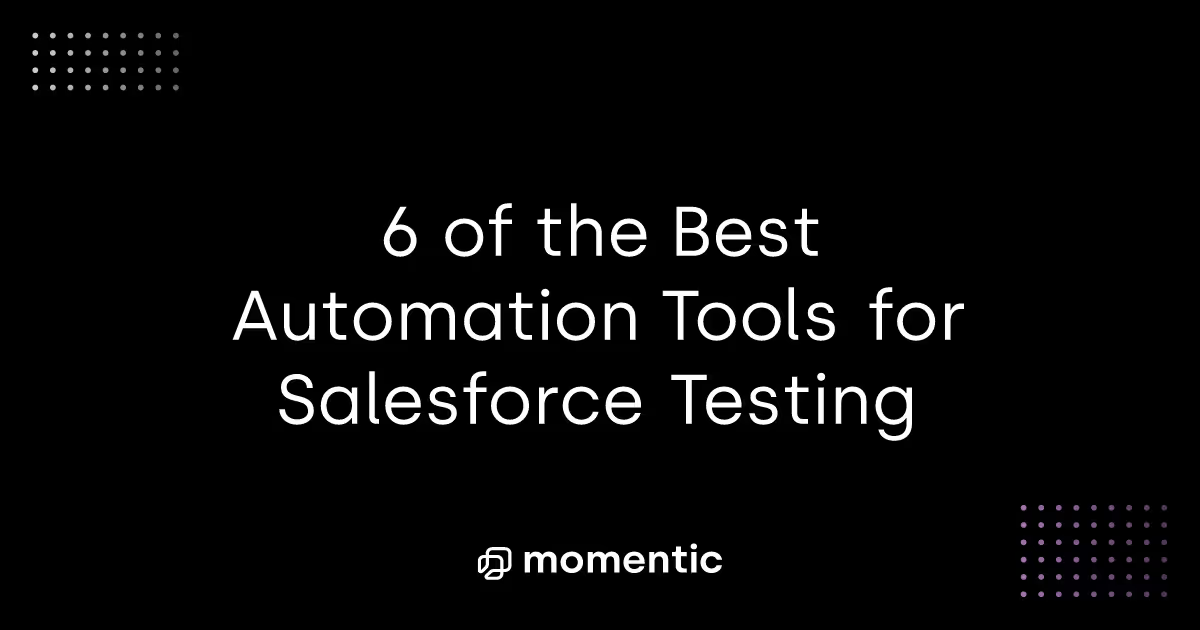

Developing apps on the Salesforce platform? If so, you'll be acutely aware of the need to thoroughly test your code before rollout, whether you're building custom internal tools or selling your apps on the AppExchange marketplace.
You'll also be acutely aware of some of the challenges Salesforce testing presents. Salesforce can be an incredibly powerful tool for enterprises, but with this comes complexity. It's difficult to get a good level of test coverage manually because of the scale of the app, and customized workflows and processes add further difficulties.
Automation tools for Salesforce testing, especially ones which simplify the process even further using AI and natural language processing, save your team hours of repetitive, frustrating work.
You can build tests in minutes, increase your coverage with no extra effort or employees, and drastically reduce time spent on test maintenance - then reinvest the hours you save into activities that add real value to your organization.
Here are our top six recommendations.
1. Best Overall Automation Tool for Salesforce Testing: Momentic
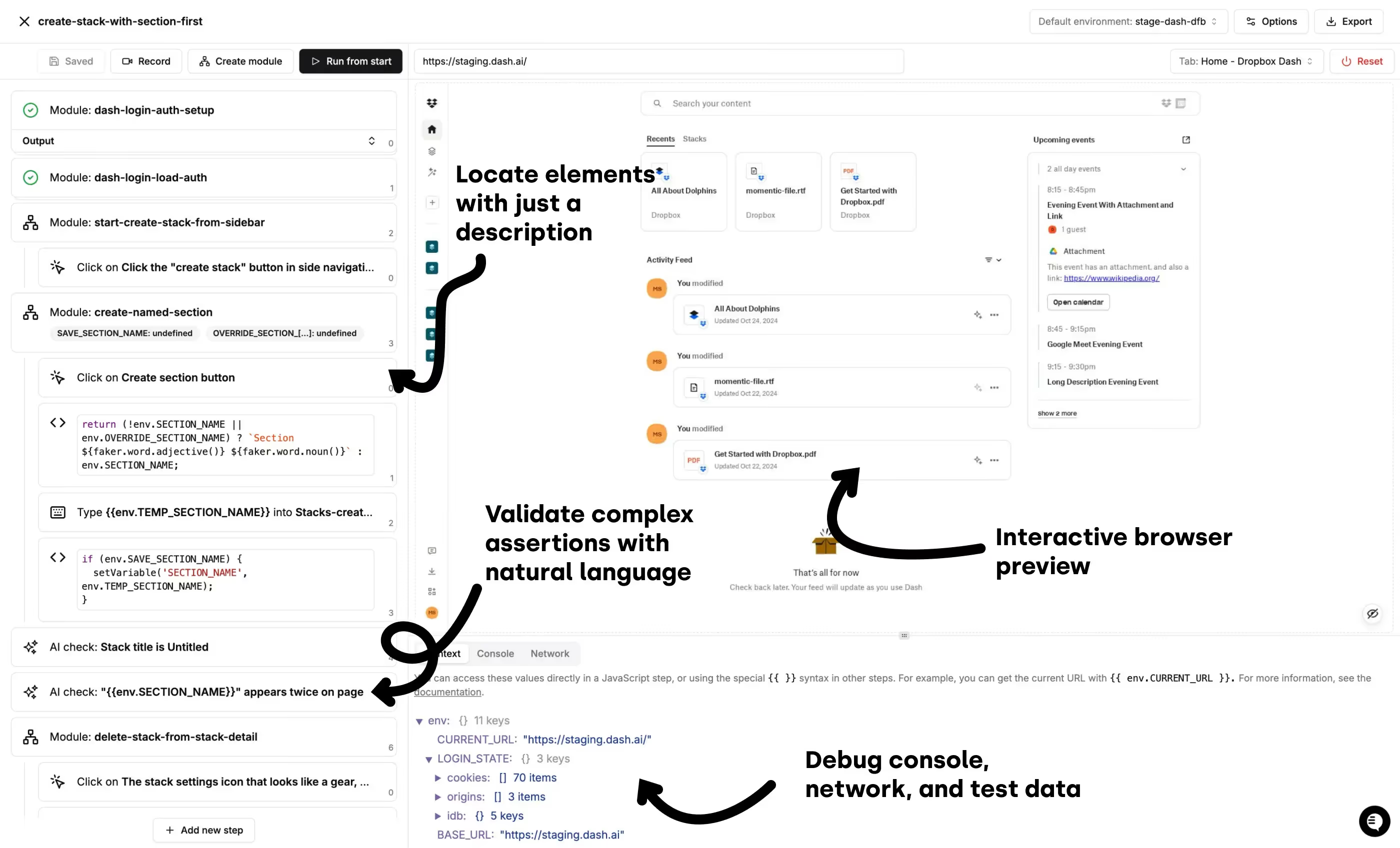
For Salesforce testing, you could choose a hyper-specialized Salesforce/enterprise software testing tool. There are good options on the market - we cover the best below.
But: remember that Salesforce is, ultimately, just a giant web app. And, unless the bulk of your testing is focused on Salesforce, those specialized solutions won't cover the rest of your testing needs across web, mobile, and desktop adequately.
This means that many organizations will save time, money, and a frustrating learning curve by choosing an AI-based testing tool that works as well for Salesforce as it does for the rest of their requirements. Two birds. One stone.
Here's why Momentic should be that choice for you.
Firstly, Momentic is all about simplicity, which allows you to expand your testing capacity and coverage with minimal extra input. There's no extended implementation period or overly-complex learning curve, so you can start testing on Day 1. In fact, it's so intuitive that “junior devs can pick it up on their first day”, according to one of our clients.
Secondly, the natural language processing features minimize the need to build test scripts with code. Build scripts by describing, in plain English, what you want to test, or let the AI suggest test cases based on app usage patterns. Combined with the flexibility to run tests anywhere (in the cloud, locally, in CI/CD pipelines, or behind private networks), this has the potential to significantly expand your test coverage.
Tests aren't affected by changes in the DOM and are self healing - so you can say goodbye to all those hours of tedious test maintenance and let your engineers do something more fun with their time.
Finally, if you're already using Gearset as a DevOps solution for Salesforce, you can integrate directly with Momentic - and our range of plug-and-play third-party integrations doesn't stop there. Momentic integrates with all CI providers, and many more tools like TestRails, Zephyr, Qase, and Jira.
2. Best Budget Automation Tool for Salesforce Testing: Selenium
On a limited budget? Need to make do with what you have, rather than implementing a new tool?
We get it. If you're weeks away from a major product launch, trying to make your seed capital stretch further, or have competing budget priorities, you might need to put investment into that shiny new testing tool on hold temporarily.
The good news is that you can automate Salesforce testing with Selenium. Your efficiency gains won't be as steep, you'll still need to dedicate engineer hours to test development and maintenance, and you won't enjoy the AI features other tools on this list offer.
On the other hand, if you have no need for anything particularly extensive, or are using Selenium as a placeholder whilst bigger and better AI plans come together, it does the job adequately.
You'll find plenty of engineers with experience using Selenium, there's a huge community for troubleshooting, and as an open-source technology it can be downloaded for free.
3. Best Enterprise Tool for Salesforce Testing: Tricentis Testim
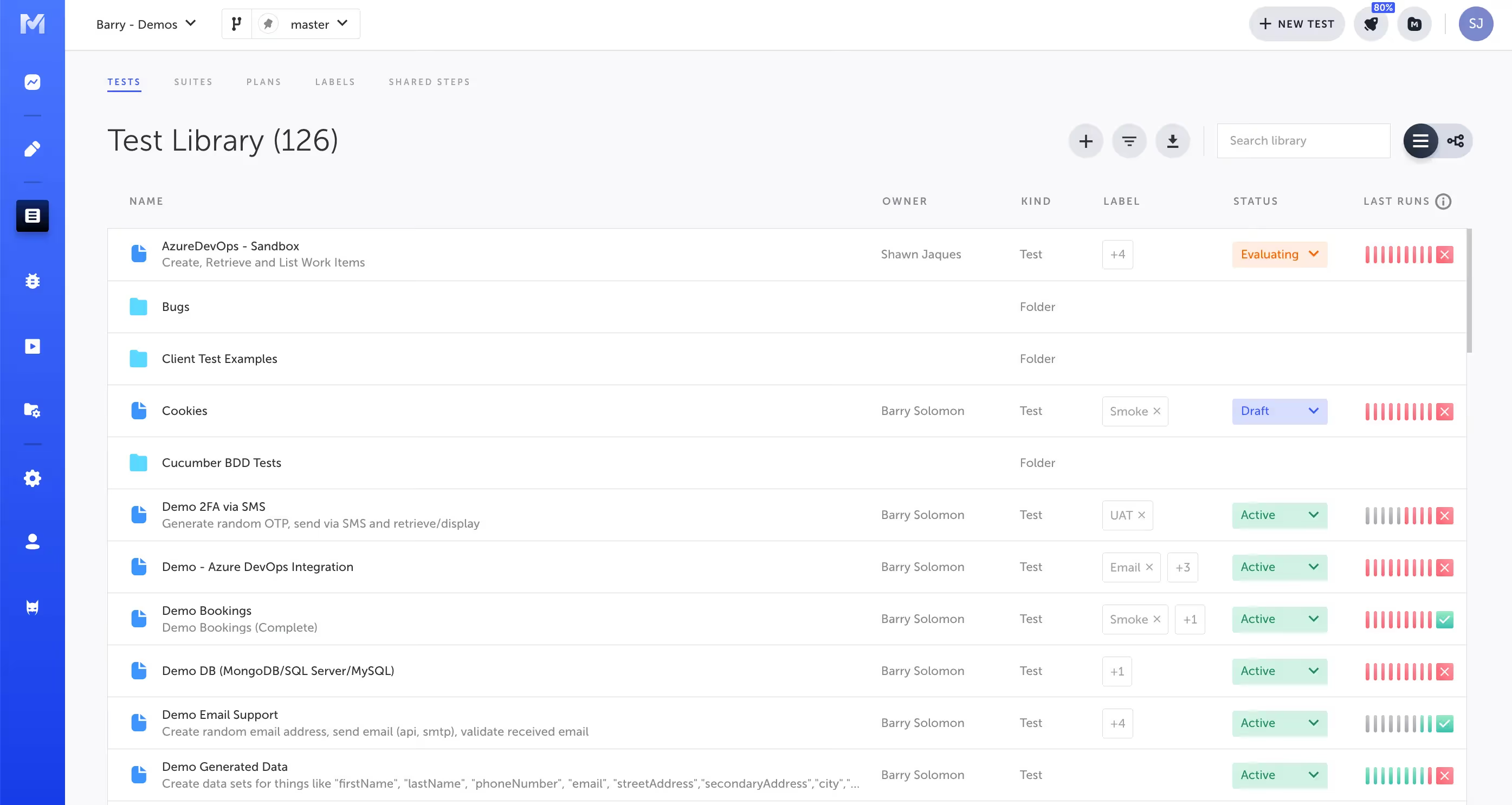
Tricentis has been an established go-to for Salesforce teams for a while - and now offers low-code AI-powered testing via its Testim platform. With robust Selenium support, it's a solid choice if you're already using Selenium and want to make life a little easier for yourself.
Optimized for Salesforce Lightning, Testim offers pre-built test steps for common Salesforce operations, locators powered by Salesforce metadata, and codeless steps for complex Salesforce operations such as permissions testing. There are also tools for testing across web, app, and mobile if you need broader functionality.
Testim allows users to record Salesforce tests as they click through their application for easy reference, and tests are self healing to cut down time on maintenance. Meanwhile, an AI copilot tool speeds up test creation, locates errors in existing code, and suggests fixes.
Testim is a relatively pricey option compared to others on this list, so might be out of reach for smaller businesses and startups. However, if you're an enterprise organization with extensive Salesforce testing needs, it could be worth the investment.
4. Best Specialized Automation Tool for Salesforce Testing: Provar
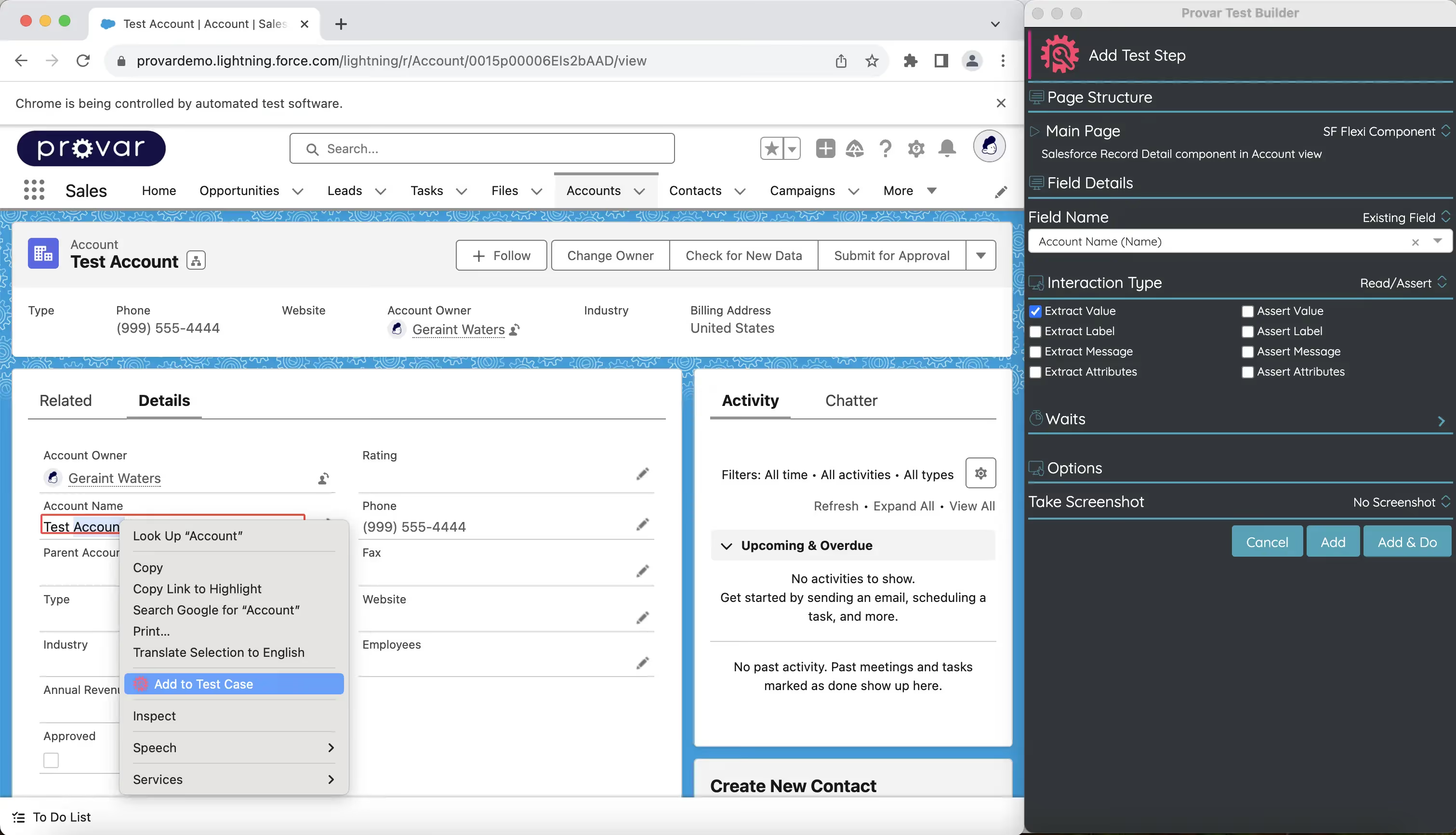
Provar is a testing tool designed specifically to work with Salesforce's unique architecture. The platform focuses on a low maintenance approach that offers speed, scalability, and reliability.
This means that if your Salesforce testing needs aren't extensive, you might find Provar too specialized - but for Salesforce-heavy organizations there are plenty of useful features that cut down time spent building, running, and maintaining tests.
Provar's AI tests are built using a 'metadata' approach - they are created using information found within Salesforce. This significantly reduces time spent on creating tests via the low-code editor, and removes any need for custom code or logic for Salesforce-supported elements.
This approach also minimizes the amount of maintenance hours your engineers need to keep Provar tests running. Salesforce supported fields, Lightning pages, and LWC all require minimal to no maintenance. Locators are generated at runtime using Salesforce metadata APIs so require no out-of-box healing.
5. Best DevOps Salesforce Testing Tool: Copado
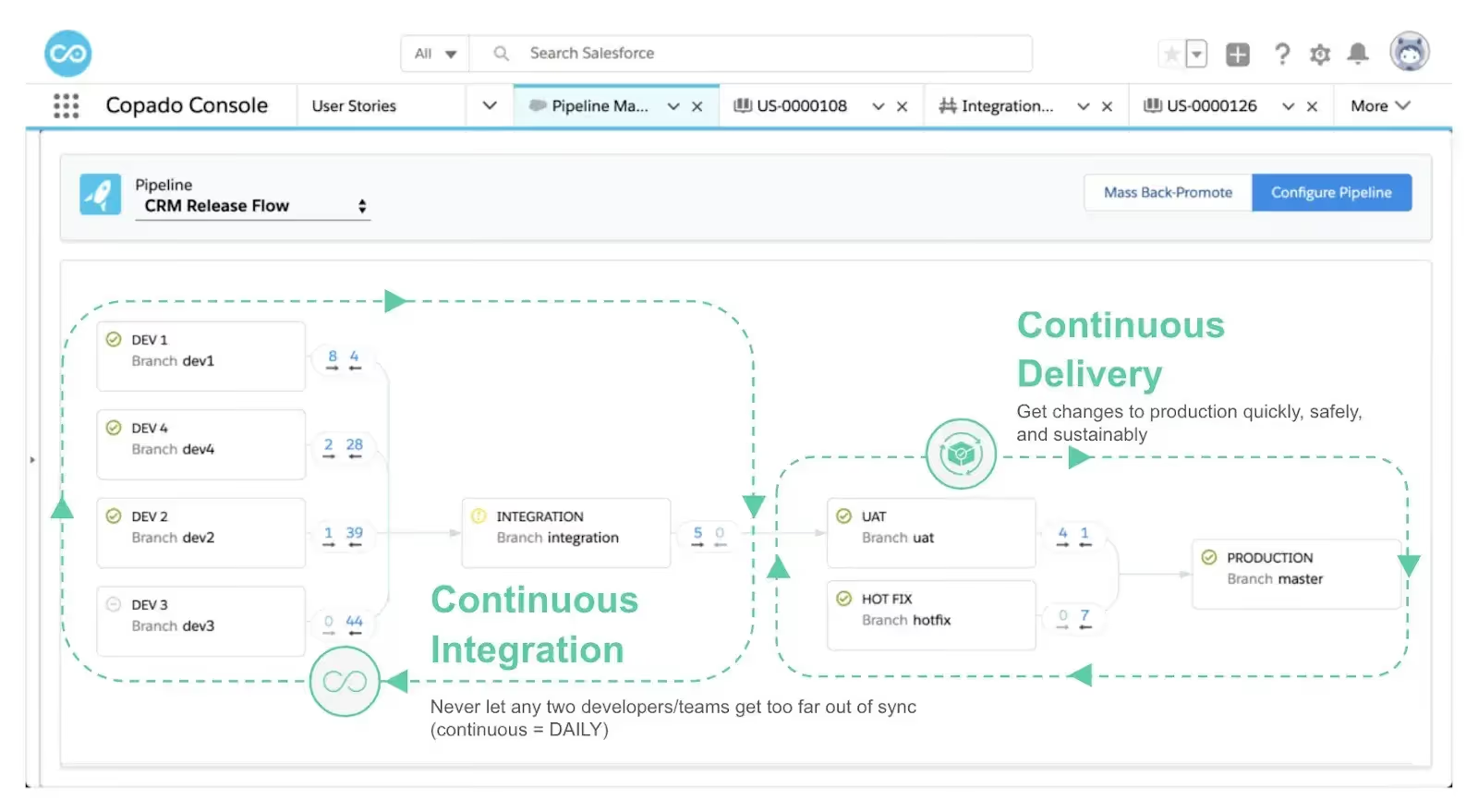
Copado is an end-to-end, Salesforce-native DevOps testing tool designed for complete CI/CD integration and rapid time-to-deployment.
On Copado's Salesforce testing platform, you'll find a useful low-code test editor underpinned by AI and natural language processing technology. This combines an extensive keyword library that allows users to build 'unbreakable' tests that work across all releases in minutes.
There are plenty of features that DevOps teams will find useful for efficient deployment management, including well-designed collaboration and visibility dashboards, click-based automation, continuous feedback mechanisms, and resource allocation. Meanwhile, Copado's environment management tools allow teams to keep on top of different Salesforce environments, ensuring that everything remains synchronized and conflicts are reduced or eliminated.
Copado is a powerful tool, which can make it resource intensive at times. There's a relatively steep learning curve for new users, and the tool will need ongoing maintenance to keep up with changes in Salesforce - but if you have the resources to commit, you'll see a strong return.
6. Best Enterprise Software Testing Platform: Opkey
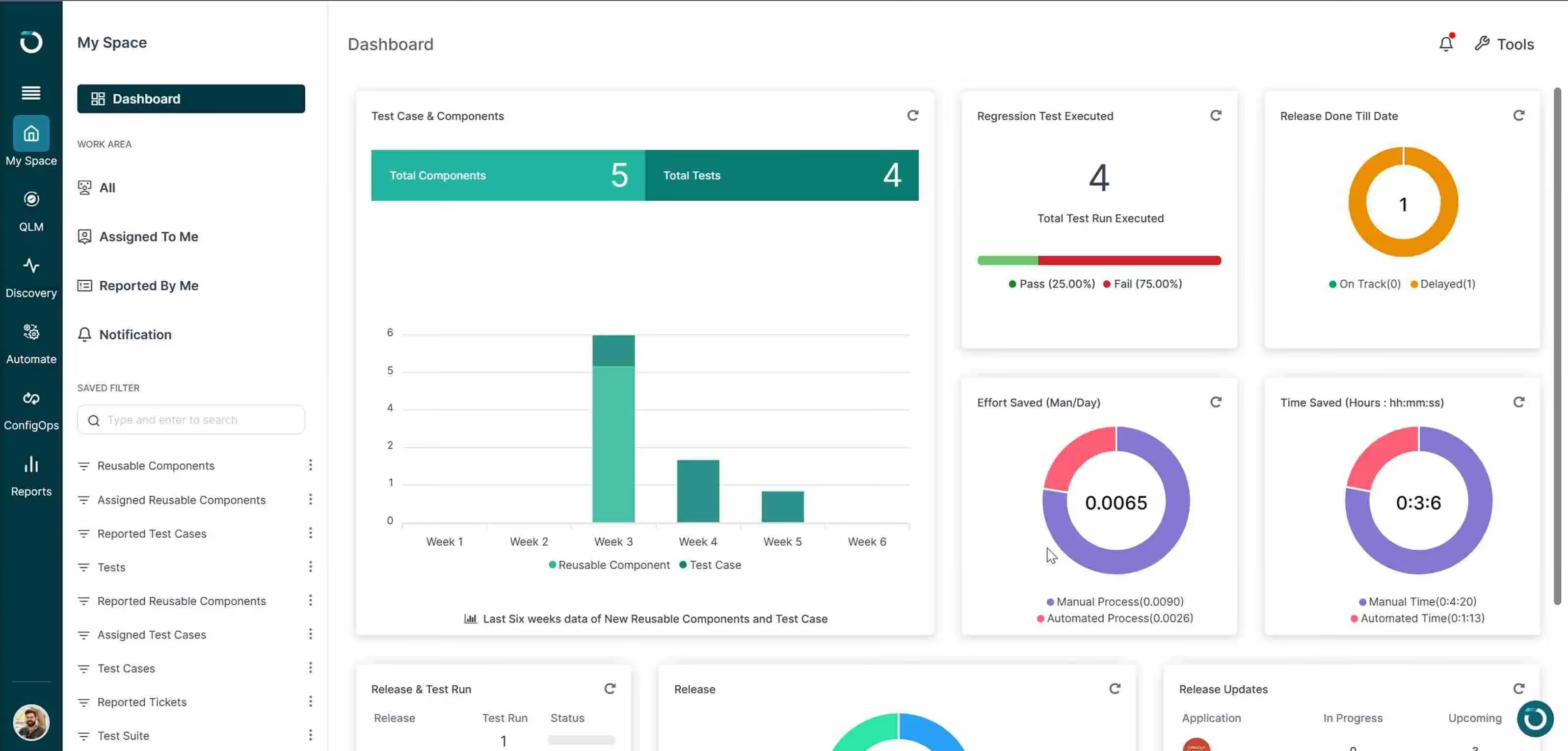
Are you looking for a Salesforce testing tool that also offers testing functionality for Oracle Cloud, Workday, SAP, Microsoft Dynamics, TrackWise, and more? If so, Opkey's AI ERP testing platform could be a strong choice.
Whilst it describes itself as an 'ERP Lifecycle Optimization Platform', Opkey has plenty of Salesforce-specific functionality that works with any custom app built on the Salesforce platform. Test scripts work across Classic and Lightning, and the test editor's no-code 'drag and drop' approach opens testing activities to a wider, non-technical user base.
Opkey's AI-powered impact analysis tools are especially useful for predicting how changes will affect your existing workflows, minimizing the risk of disruption. Its list of out-of-box integrations is pretty strong too (ALM, Jira, Azure DevOps, qTest , Bitbucket, MS Azure Pipeline, Octane, Jenkins, and Bamboo, pCloudy, and Sauce Labs to name a few).
Momentic: Your New Salesforce Testing Tool?
“Momentic makes it 3x faster for our team to write and maintain end to end tests.”
Alex Cui, CTO, GPTZero
We'd love to see if Momentic's AI testing features could help you minimize the time you spend running Salesforce tests and maximize focus on valuable project work.
If, like Alex and his team, you're keen to save over two thirds of the time you spend on key testing processes, why not schedule a conversation with our team?


